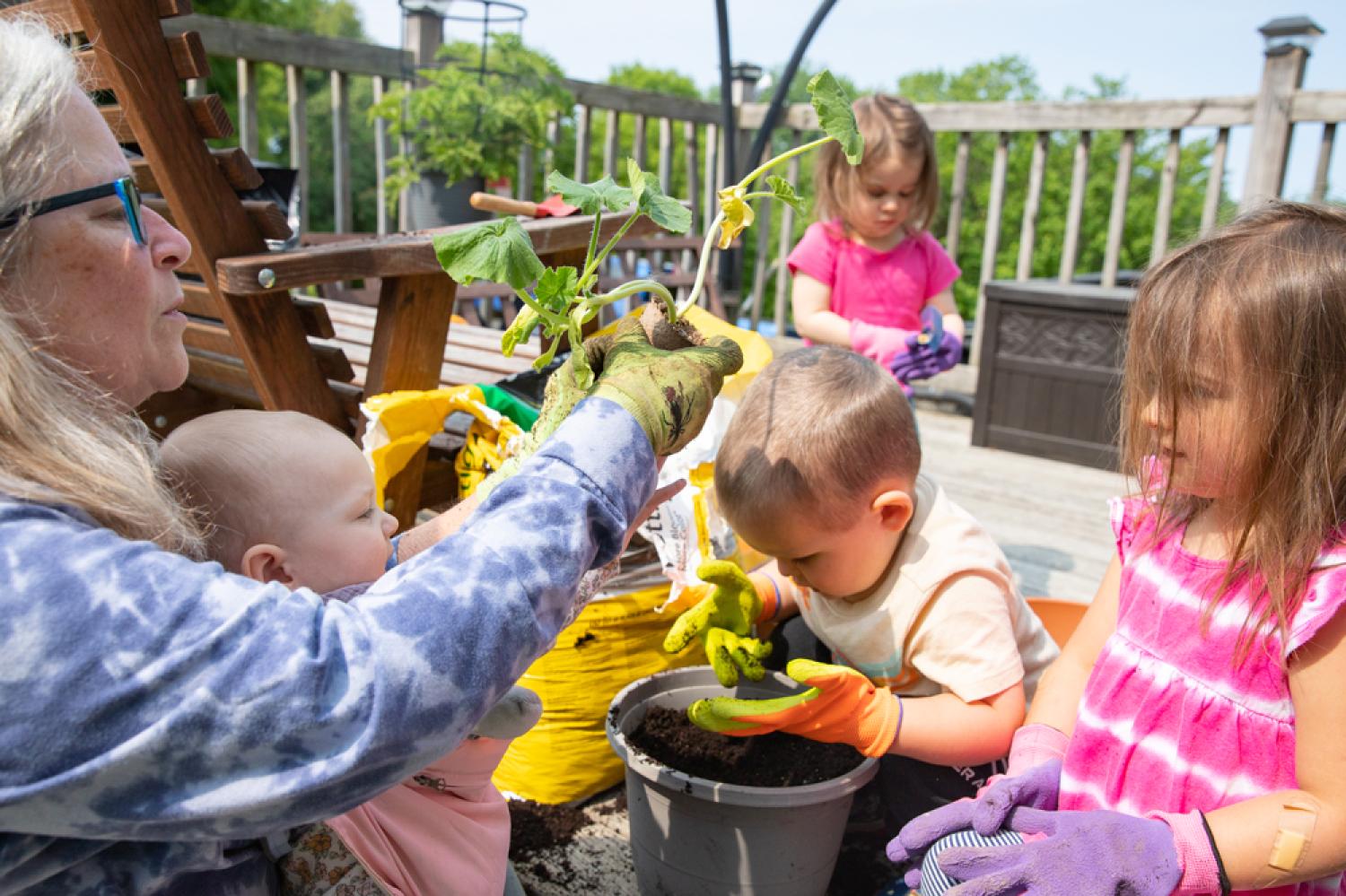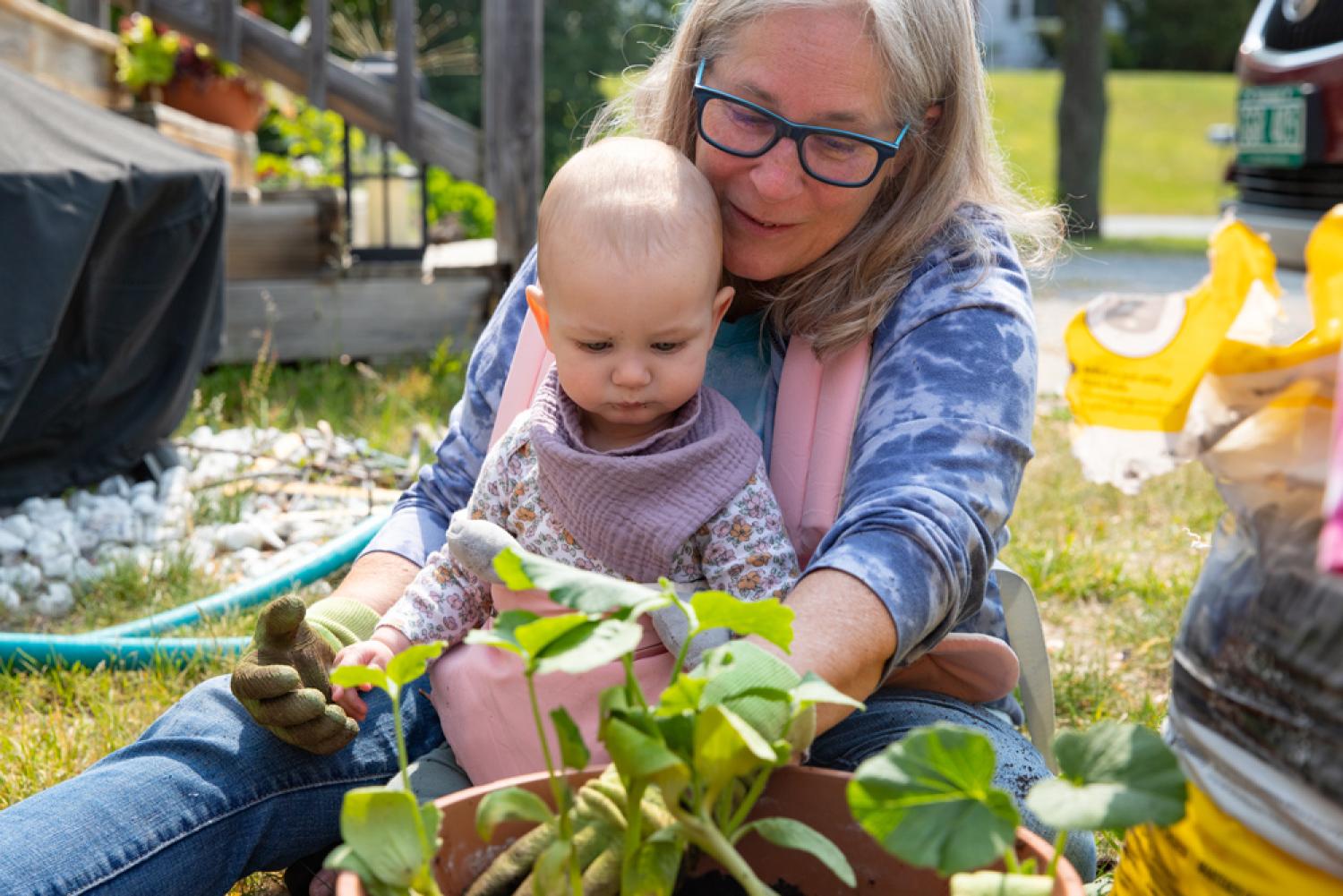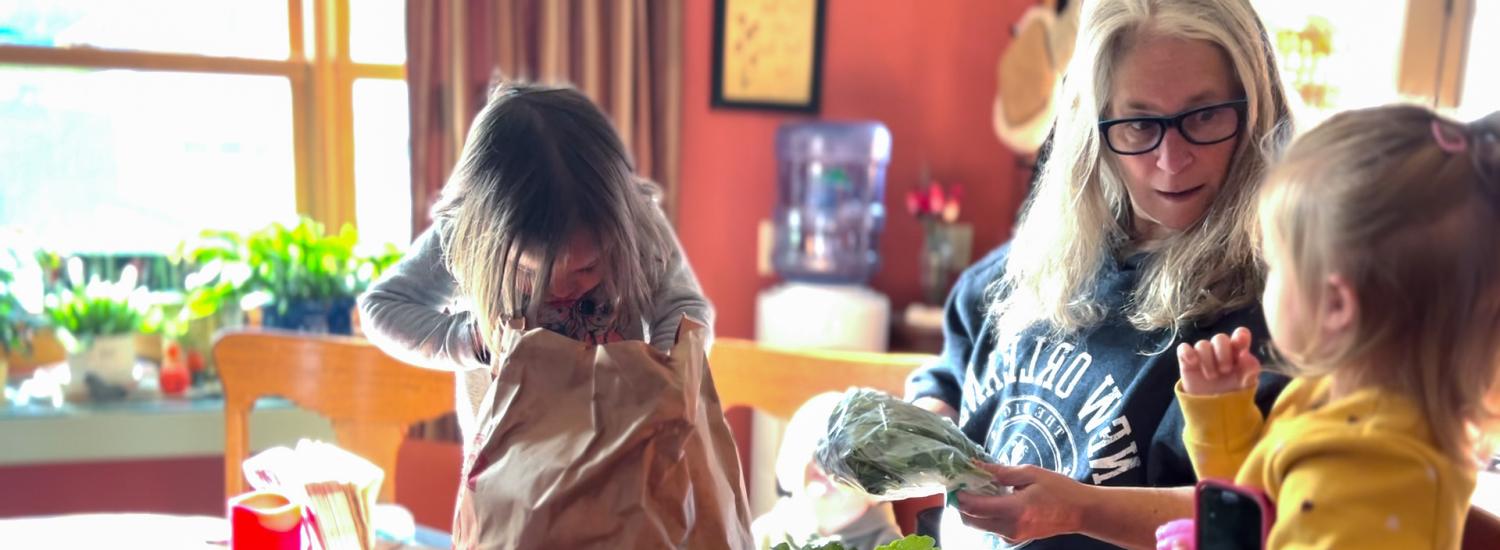By connecting young children with fresh, locally sourced food, farm to early childhood programs are not only supporting their health and development, but also creating ripple effects that benefit communities and local food systems.
Delivery Day
Every Thursday morning at Laura Butler's early childhood program, children gather by the window, eagerly waiting for a very special delivery. As the clock ticks closer to 10:00AM, they keep a close eye on the driveway, excitedly guessing which vehicle might arrive carrying their weekly farm share from Blue Heron Farm.
The truck arrives! As the bags are unloaded, the kids head outside to greet the farmer. This personal connection to the source of the food we eat is important to Laura, who believes that learning about the whole food system is crucial to the children's education in her program.
Back inside, the kids take turns reaching into the bags to unpack their farm-fresh discoveries. It takes them anywhere from 30 to 45 minutes to empty the bag, as they carefully examine and discuss each item, from handfuls of kale to bags of peas, sometimes pausing to look up new foods they haven't seen before. With the help of Blue Heron Farm's shared recipes, the kids have been able to taste new and delicious foods they haven’t experienced before.

Digging into Tools & Resources
For over 25 years, Laura Butler has operated her child care center, Imagination Island, from her home in Milton. In 2019, Laura participated in a farm to early childhood professional learning program at Shelburne Farms and immediately recognized the potential to integrate food systems learning into her work and bring her vision of integrated community, family, and meals to life.
Soon thereafter, Laura applied for a Community Supported Agriculture (CSA) grant from the Vermont Agency of Agriculture, Food, and Markets. She needed to find a farm to work with, and she was happy to discover that Blue Heron Farm in Grand Isle was already delivering to her neighbor just across the street. Laura describes the CSA as “fantastic”— it even included extra food to send home with families.
Laura and her class developed a close relationship with Blue Heron Farm Farmer and Owner Christine Bourque, and after the grant year was over, Laura continued the CSA membership, adding egg and chicken shares to her order. The weekly deliveries and local foods became a way for Laura, and the families, to deepen the kids’ understanding of the circle of life and how it relates to the foods we eat.
One Minute of Joy: Imagination Island Unboxes Their Local CSA
The Magic of Community
Laura Butler's commitment to building community among her families and children is a central theme of her farm to early childhood program. Her program not only focuses on providing nutritious meals and snacks for the children in her care, but also on sharing the love of food and cooking with their families.
She includes kids in the kitchen and making meals; over the summer they made pickles, stews, and spaghetti sauce. With every culinary creation, each child received a container of food to take home that evening. Laura explains, "We're not only eating the food in the program, we're sharing the recipes and the food with our families."
The learning and sharing continued in the garden, too. Two families with kids in Laura’s program grew extra crops in their home gardens in order to share the bounty. Laura's garden produced heirloom tomatoes and footlong beans, one family grew a salad garden with cherry tomatoes and lettuce, and another grew butternut and Blue Hubbard squash. Laura says, "To me, the lesson for the kids was that we're all growing things. They're helping in my garden. They're helping in their own gardens. And we're sharing, and that's what a community does: share and help support each other."

The culture of sharing that Laura fosters with her families is also working to break down the barriers that parents may experience when it comes to asking for help. Laura notes, "There's some kind of wall that parents put up, they don’t want people to know they need something. But through our shared food, cooking, and gardening experiences, people have opened up. They’ll say, 'Oh, we're going to make this recipe with the food that you sent home. Do you have any of this or that ingredient, because I don't have any?' They don’t feel like they’re asking for something because we’re sharing."
Laura has created a space where food and community intersect, providing a nurturing environment for children and families to learn and support one another. And through community, the families and children in her program now share a sense of equality. As she puts it, "We're all on equal footing here. I get pride in being able to share with my families. That's really important to me."
-
-
Benefits to Early Childhood Education Providers:
- Creating a culture of health and wellness by integrating whole and nutritious foods.
- Connecting young children with farmers so they understand where their food comes from, which can help them develop skills and attitudes that foster nutritious eating habits.
- Infusing outdoor learning opportunities into existing curriculum and family engagement activities.
- Fostering stronger relationships with parents, neighbors, and community partners.
- Enhancing program quality by meeting multiple learning and programmatic standards through alignment with child care licensing regulations, Vermont Early Learning Standards, and CQI systems like STARS.
-
Benefits to Producers:
- Increased demand for locally grown produce and other farm products.
- Opportunities to build relationships with early childhood educators, families, and other community partners, leading to increased visibility and potential for marketing and sales.
- Opportunities to engage in education and outreach, helping to increase awareness and understanding of the importance of local food systems.
- Keeping local dollars in the local economy while supporting Vermont’s producers and agricultural system.
-

Laura introduces her youngest learners to hands-on learning in the garden. Photo by Sarah Webb. Talk to Laura, or Centers Like Hers
- Connect with Connect with Laura Butler: [email protected]
- Connect with the Vermont Farm to Early Childhood Coalition via Shelburne Farms Farm to Early Childhood Partnership Manager Cynthia Greene: [email protected]
Connect to Organizations
- Vermont Farm to School & Early Childhood Network: networking information, regional partner organizations, resources, and updates on Vermont’s efforts to promote farm to school and early childhood initiatives statewide.
- Northeast Organic Farming Association of Vermont: find and connect with producers
- National Farm to School Network Resources: a sortable database of resources
Apply for Professional Learning Programs & Grants
- Northeast Farm to School Institute: Vermont FEED’s unique year-long professional learning opportunity for selected school, district, or early childhood teams from New England and New York.
- Vermont Agency of Agriculture Food and Markets’ Farm to School and Early Childhood Grants Program: financial and technical assistance to schools or early childhood education organizations looking to develop or expand their farm to school programs.
- KidsGardening: garden grants, curriculum, and educator workshop resources.
The Association of State Public Health Nutritionists' Farm to ECE grantee programs are supported by the Centers for Disease Control and Prevention (CDC) of the United States (U.S.) Department of Health and Human Services (HHS), as one of several projects funded by cooperative agreement number NU38OT000279 (total of $6,320,000). This resource was supported by ASPHN's Farm to ECE grantee program, which is funded by the Division of Nutrition, Physical Activity and Obesity (DNPAO)/ National Center for Chronic Disease Prevention and Health Promotion (NCCDPHP)/CDC/HHS. The contents of this resource are those of the author(s) and do not necessarily represent the official views of, nor an endorsement by DNPAO/NCCDPHP/CDC/HHS, or the U.S. government.
